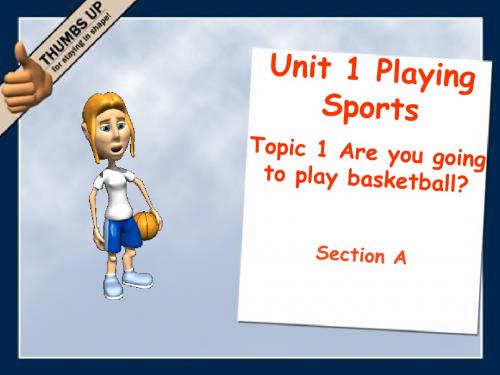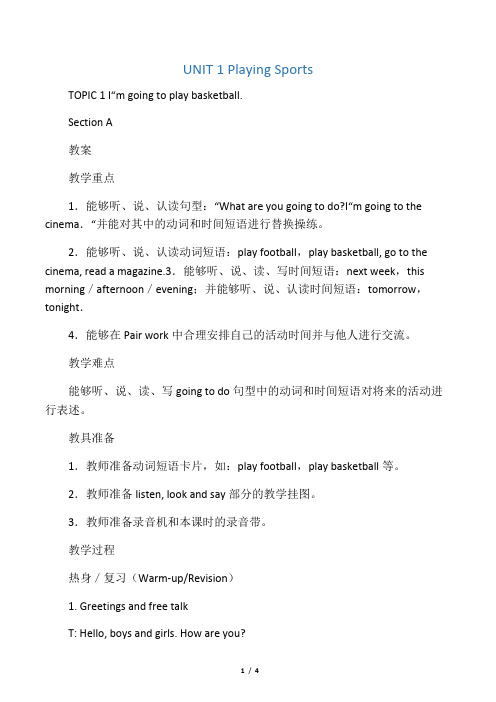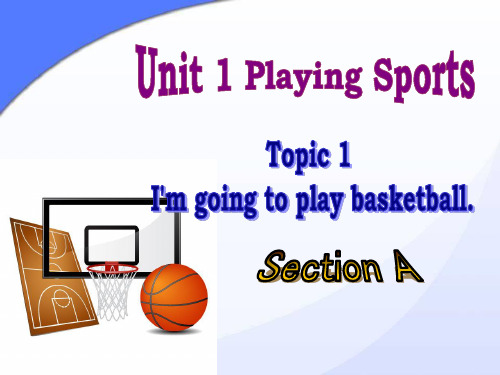仁爱版英语八年级上册unit1 topic1 sectionA
仁爱版新版八年级(上册)英语Unit1topic1SectionA课件

放映结束 感谢各位的批评指导!
谢 谢!
让我们共同进步
Join参加,加入
• join+ 团体 • join in通常指参加某种活动,尤其指和其他人一起参加某
项活动。 ①May I join in the game?我可以参加这个比赛吗? take part in指参加群众性活动、会议、劳动、游行等,往 往指参加者持有积极的态度,起一份作用,有时与join in 可互换。例句: • We should take part in school activities.我们应该积极参 加学校的活动。 = join in
Me, too.常用于自己的做法或想法与别人的一致时。 e.g. —I like drinking milk in the morning.我喜欢早晨喝牛 奶。
—Me, too. 我也是。
also , as well
also, 也 I also like drinking milk in the morning
He is going to write a letter tonight.
He will write a book one day.
see sb. do sth.看见某人做了某事;强调看见动作的全过 程,现在动作已结束。 see sb. doing sth. 看见某人正在做某事,强调动作正在进行。
• prefer 更喜欢+ 名词/动名词/不定式 • P 109 • I prefer apples. • I prefer playing basketball. • I prefer to play basketball.
prefer … to… 和。。。相比更喜欢。。。 I prefer apples to bananas. 和香蕉相比,我更喜欢苹果。
仁爱版英语八年级上册unit1_topic1_sectionA_and_sectiomB

Read and say (录音1)
Michael: Hi, Kangkang.
play basketball ? I saw you Kangkang: Hi, Michael. Are you going to ________________
play basketball ________ almost every day ________ during the summer holidays.
提示词 Yes, quite a bit/a lot. No, seldom. basketball football
Do you … much?
swimming running
volleyball
table tennis cycling rowing skating skiing
提示词 Yes, I am.
basketball
football swimming running volleyball
Are you going to join the school … club?
table tennis
cycling rowing skating No, I’m not. I’m going to … skiing
Practice
用所给的词适当形式填空 will/is going to join (join) the football game against No.2 1.Jack ___ High School this Sunday. is leaving (leave)for Japan next month. 2.My uncle __ 3.I am going to (be) a doctor when I grow up. will be (be)sunny later on today. 4.--it ___ 5.Our teachers will\are going to visit (visit) the Great Wall if it does’t rain tomorrow. is going to rain (rain) 6.Look at the cloud,It _
仁爱版英语八年级上册_unit1_topic1_sectionA

Yes, quite a bit/a lot.
Do you … much?
No, seldom.
仁爱版英语八年级上册
提示词 basketball football swimming running volleyball table tennis cycling rowing skating skiing
Which sport do you like better, … or …? I like … better. Which sport do you prefer, … or …? I prefer …
仁爱版英语八年级上册
Which sport do you prefer, … or …?
I prefer …
hope (that) 从句 e.g:I hope (that) you are coming to the party.
7.prefer "更喜欢" prefer doing/ to do sth,更喜欢、宁愿做某事 e.g: Do you prefer watching /to watch TV at home?
仁爱版英语八年级上册
Which sport do you like better, … or …?
I like … better.
仁爱版英语八年级上册
提示词 basketball football swimming running volleyball table tennis cycling rowing skating skiing
I saw Tom playing basketball on the playground yesterday.
2.almost "几乎,差不多" 放在be动词后边,或行为动词之前。 e.g: I almost fell off my bike.
仁爱版八年级英语上册Unit1 Topic1 Section A优质课教案设计

Unit1 Playing SportsTopic1 I’m going to play basketball.SectionA 优质课教案教学设计思路:本节课主要活动为SectionA的1a。
通过1a中Michael和Kangkang的对话,呈现了本课所要学的语法重点:be going to do结构表示一般将来时。
首先通过一首英文歌曲引入be going to do句型和运动。
由一个短视频让学生了解更多运动后,让学生看图片说运动。
再由歌曲唱出单词和句型。
然后通过小游戏和音频结合,让学生听音辨运动,从而巩固新单词。
然后由拖延症患者Mr.—Going—to—do 引出be going to do句型进行反复练习。
再根据学生的周日计划,导入Michael 和Kangkang的周日计划,对1a进行泛听,并完成1b。
接着学生通过看视频精听对话,判断1c四种说法是否正确。
在充分听和读1a对话内容之后,根据1a 造句。
然后整合1a和1d内容并改编,结合当下大热的电视剧《择天记》进行对话练习,再次巩固课文内容。
最后小组合作写一篇暑假计划报告,升华本课内容。
I. Teaching aims1. Knowledge aims:(1)学习并掌握关于运动的新词汇:football, row, table tennis,…(2)能正确运用be going to do表达自己的计划。
2. Skill aims:(1)能听懂有关运动计划简单对话和陈述。
(2)能正确地口头表达有关运动计划的话题。
(3)通过对SectionA的学习,学生能够写出自己的暑假计划,并讨论各自将要做的事。
3. Emotional aims:(1)帮助学生养成运动的好习惯,学会强身健体,唤醒学生的运动意识。
(2)培养学生的执行能力,拒绝拖延。
Ⅱ.The key points and difficult points1. Key points:能正确、熟练地运用be going to do句型。
仁爱版英语八年级上册Unit1 Topic 1词块整理

八年级U1T2复习资料Section A 词块整理1.举办一场足球赛2.患病,病倒3.乐意做4.不要紧5.继续努力6.帮某人一个忙7.在......方面做得好8.乱扔9.立刻/10.介意做某事11.持续做某事12. 练习做某事13.把......踢给......重点句型:1.你介意教我吗?2.我把球踢给你。
3.你介意我再试一次吗?4.你介意不要把你的自行车放这吗?5.你介意不要乱扔瓶子吗?Section B 词块整理1.对某人大声叫喊2.尽某人最大努力3.生某人的气4.谈论,讨论5.向某人道歉6.为某事感到遗憾7.确信做某事8.学会团队合作9.完成某人的家庭作业重点句型:1.迈克尔不擅长足球但是他尽力了。
2.不要对彼此生气。
3.我对我所说的感到抱歉。
4.他们学会团队是很重要的。
5.我的爸爸给我的弟弟买了一个篮球。
语法:双宾语结构Section C 词块整理1.最受欢迎的运动之一2.起先3.在恶劣的天气里4.有......的历史5.形成,产生6.阻止某人做某事7.遵守规则8.例如9.越来越流行10.后天11.全世界/12.做某事对某人来说很重要本节词义转换:play→player invent→inventor→invention本节词义辨析:a number of/the number of重点句型:1.篮球是美国最受欢迎的运动之一。
2.有一个世纪的历史。
3.对你和其他选手来说作为一个团体很重要。
4.篮球在全世界变得越来越流行。
Section D 词块整理1.仅仅为了娱乐2.使......变成3.围......坐4.享受阳光本节词义辨析:other/another/the other/others语法:双宾语结构一般将来时时:will do sth. (中考必考)八年级U1T2复习资料答案Section A 词块整理1.举办一场足球赛have a soccer game2.患病,病倒fell ill/be ill3.乐意做be glad to do sth.4.不要紧Not at all.5.继续努力keep trying6.帮某人一个忙give sb. a hand7.在......方面做得好do well in/be good at 8.乱扔throw sth. around9.立刻at once / right away10.介意做某事mind doing sth. 11.持续做某事keep/go on doing12. 练习做某事practice doing sth. 13.把......踢给......kick sth.to sth.重点句型:1.你介意教我吗?Would you mind teaching me?2.我把球踢给你。
仁爱版八年级英语上册UNIT 1 TOPIC 1 Section A教案

UNIT 1 Playing SportsTOPIC 1 I“m going to play basketball.Section A教案教学重点1.能够听、说、认读句型:“What are you going to do?I“m going to the cinema.“并能对其中的动词和时间短语进行替换操练。
2.能够听、说、认读动词短语:play football,play basketball, go to the cinema, read a magazine.3.能够听、说、读、写时间短语:next week,this morning/afternoon/evening;并能够听、说、认读时间短语:tomorrow,tonight.4.能够在Pair work中合理安排自己的活动时间并与他人进行交流。
教学难点能够听、说、读、写going to do句型中的动词和时间短语对将来的活动进行表述。
教具准备1.教师准备动词短语卡片,如:play football,play basketball等。
2.教师准备listen, look and say部分的教学挂图。
3.教师准备录音机和本课时的录音带。
教学过程热身/复习(Warm-up/Revision)1. Greetings and free talkT: Hello, boys and girls. How are you?S: Hello, Miss. I’m fine, thank you, and you?T: I’m fine, too. Thank you very much.(Say hello to the teachers together)教师课前放歌曲“What Are You Going to Do?“学生初步感知be going to do句型。
师生进行日常会话,可将重点放在动词短语的问答上,如:T:What day is it today ?S:It“s Tuesday.T:What day is it tomorrow ?S:It“s Wednesday.T:What do you usually do On Wednesdays/in the evening?S:I usually read books.呈现新课1. Lead in(1)学生朗读书本段落进行学习。
Unit1+Topic1+Section+A课件+2022-2023学年仁爱版八年级英语上册

[dʒɔɪn] v.
[tiːm] n.
practice ['præ ktɪs] v.
Before the game, we practiced quite a lot with
classmates.
[kwaɪt] adv.
Because we know practice makes perfect. (熟能生巧)
Listen again and mark T (True) or F (False). Circle the key words.
1. Michael is going to play football. ( )
2. Michael doesn’t like· playing basketball,
Many... are going to join the... We are going to practice...
Many students came and cheered us
on.
In the end(最后), we won the game. be going to+ V原形
—What are you going to do this weekend? —I’m going to...
同……进行一场篮球赛
1.Find more English words about sports.(积累生词:词义、音标)
2.Recite 1a. 3.Finish the workbook(SA)练习册。
2 Make a dialog with your partner, using the following sentences.
run-running ski-skiing(滑雪)
仁爱版英语八年级上册 Unit1 Topic1 SectionA 参考教案

(最新版)Unit1Topic1 SectionA参考教案Ⅰ. Material analysisSection A and Section B 的内容整合,建议用三个课时上完。
本节课为单元第一课和第二课时,用两课时上完。
主要活动为Section A 的1a和2。
通过Michael和Kangkang的对话,呈现了本课所要学的语法重点:将来时be going to do结构。
结合本单元的话题Playing Sports, 呈现了重点短语:play basketball/football, have a ba sketball/football game, cheer … on, win (the game), prefer doing等。
Playing Sports这个话题和学生们的生活紧密相连,容易激发学生的学习兴趣。
但要正确使用be going to do对学生来说还是有一定困难的。
困难一:be动词和主语不一致(多数学生);困难二:不会正确地将do替换成具体动词(少数学生)。
所以,要求老师以课本文本内容为依据,结合学生的实际生活,引导学生正确地使用be going to do谈论自己的运动计划,并能用书面表达形式写出自己的运动计划。
Ⅱ. Teaching aimsKnowledge aims:1. 能根据音标正确朗读出下列单词表中的单词:team, win, cheer, row, quite,during, against, practice…2. 能正确拼读并运用单词表中的黑体单词。
3. 能正确运用be going to do 表达运动计划。
4. 能正确地运用prefer doing结构表达喜好,如:prefer swimming, preferrowing等。
5. 能运用本课所学语言,就自己的运动计划与他人交流。
Skill aims:1. 能听懂有关运动计划和运动爱好的简单对话和陈述。
2. 能正确地口头表达有关运动计划和运动爱好的话题。
- 1、下载文档前请自行甄别文档内容的完整性,平台不提供额外的编辑、内容补充、找答案等附加服务。
- 2、"仅部分预览"的文档,不可在线预览部分如存在完整性等问题,可反馈申请退款(可完整预览的文档不适用该条件!)。
- 3、如文档侵犯您的权益,请联系客服反馈,我们会尽快为您处理(人工客服工作时间:9:00-18:30)。
a basketball team
Basketball Game
Class 3 against Class 4 This Sunday Would you like to come and cheer us on?
Listen to the tape and answer the questions. (录音1) 1) What is Michael going to do? He is going to play basketball. 2) Would Kangkang like to come aபைடு நூலகம்d cheer them on? Yes, he’d love to. 3) Which class is Michael’s class going to play against? Class Three.
Read and say (影片1)
1.see sb do sth 看见某人做了某事,强调看见动作的全过程, 现在动作已结束。 see sb doing sth.看见某人正在做某事,强调动作的正在进行。 e.g: I often see Tom play basketball on the playground. I saw Tom playing basketball on the playground yesterday.
提示词 basketball football Which sport do you prefer, … or …? I prefer … swimming
running
volleyball table tennis cycling rowing
skating
skiing
提示词
basketball football
8.quite用于肯定句"完全,十分,相当" quite a few 相当多的。 quite a lot 许多,大量 quite a bit=quite a lot
9.join 加入,参加 后接人或 组织 e.g:join the party, join us join in 后接活动, e.g:join in the school sports meet.
basketball
football swimming running volleyball
Are you going to join the school … club?
table tennis
cycling rowing skating No, I’m not. I’m going to … skiing
Do you often …? Yes, I do. / No, I don’t.
swimming running
volleyball
table tennis cycling rowing skating
skiing
Do you often …?
Yes, I do. / No, I don’t. Do you … much? Yes, quite a bit/a lot. /No, seldom.
提示词 basketball football Which sport do you like better, … or …? I like … better. swimming
running
volleyball table tennis cycling rowing
skating
skiing
Which sport do you like better, … or …? I like … better. Which sport do you prefer, … or …? I prefer …
提示词 Yes, quite a bit/a lot. No, seldom. basketball football
Do you … much?
swimming running
volleyball
table tennis cycling rowing skating skiing
提示词 Yes, I am.
We can:
1. talk about sports and games. 2. talk about preferences.
1.用be going to造五个句 子,要求用不同的人称、 句式。 2.仿照 Part 2 与同桌进 行对话。
Practice the dialog with your partner, using “I’m going to…” and act it out.
Listen to the conversation and then complete the table. (录音2)
Name Michael
5.cheer sb on"为某人喝彩" e.g: Our friends will cheer us on.
6.hope to do sth,希望做某事 e.g: I hope to study in Japan.
hope (that) 从句 e.g:I hope (that) you are coming to the party. 7.prefer "更喜欢" prefer doing/ to do sth,更喜欢、宁愿做某事 e.g: Do you prefer watching /to watch TV at home? prefer... to ..."比起...更喜欢..."可接名词、代词或动名词 e.g:I prefer bananas to apples. I prefer swimming to playing football.
sports
basketball swimming volleyball skating cycling
table tennis running rowing football skiing
More sports
gymnastics badminton shooting weightlifting hurdle race diving
Time
Saturday morning
Saturday afternoon
Activity
do his homework play volleyball have a table tennis game
Kangkang Saturday morning
We learn:
the future tense with “be going to”.
Make a dialog with your partner, using the following sentences.
A: Which sport do you prefer, … or …? B: I prefer … A: Do you … much? B: Yes, quite a bit/a lot. / No, seldom. A: Are you going to join the school … club? B: Yes, I am. / No, I’m not. I’m going to …
